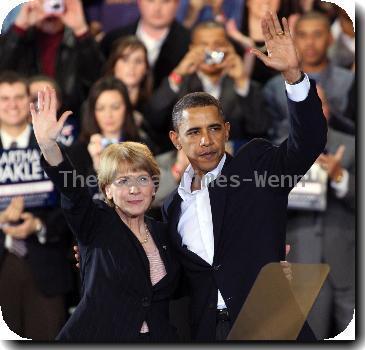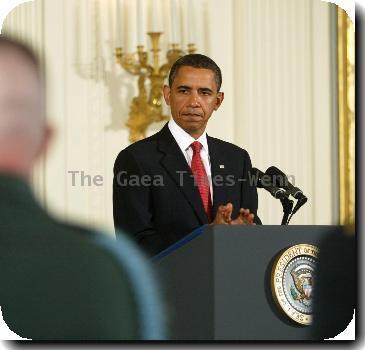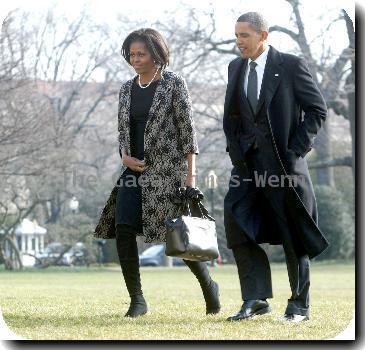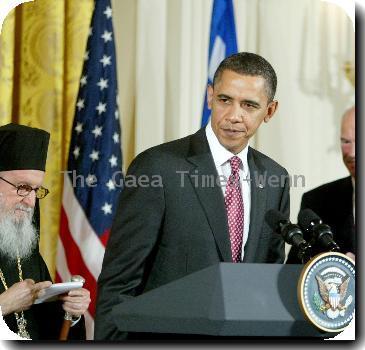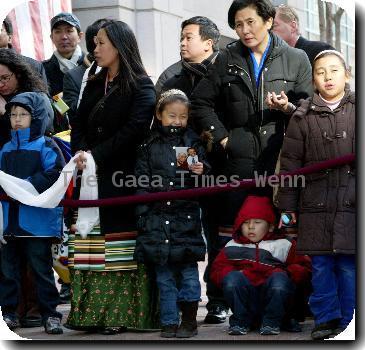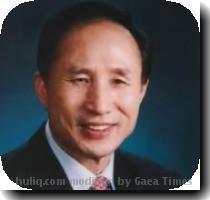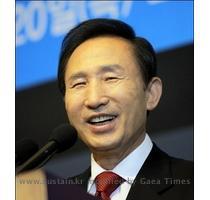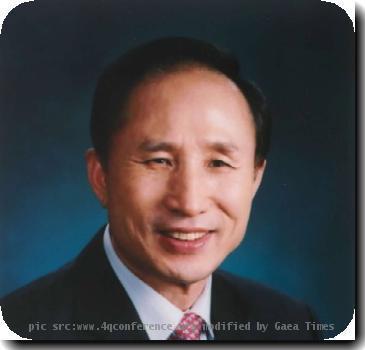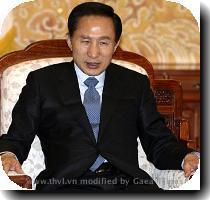SKorea’s Lee says NKorea must pay for ‘brutality,’ will take North to Security Council
By Jean H. Lee, APSunday, May 23, 2010
Lee: NKorea must pay for torpedo attack on warship
SEOUL, South Korea — South Korea’s president lashed out Monday at North Korea by suspending trade in a move aimed at crippling the impoverished regime as payback for a torpedo attack on a warship that killed 46 South Korean soldiers.
President Lee Myung-bak also pledged to haul Pyongyang back to the U.N. Security Council for possible additional international sanctions and prohibited North Korea’s cargo ships from passing through South Korean waters — in retaliation for the March 26 sinking.
In Washington, the White House said President Barack Obama fully supports the South’s measures, and the traveling U.S. secretary of state said she was conferring on a response to the North’s “provocative acts” with China, a veto-wielding permanent seat holder on the Security Council.
“U.S. support for South Korea’s defense is unequivocal, and the president has directed his military commanders to coordinate closely with their Republic of Korea counterparts to ensure readiness and to deter future aggression,” a statement from the White House said.
Lee called it a “critical turning point” on the tense Korean peninsula, still technically in a state of war because the fighting ended with a truce, not a peace treaty.
“We have always tolerated North Korea’s brutality, time and again. We did so because we have always had a genuine longing for peace on the Korean peninsula,” Lee said in a solemn speech to the nation from the halls of the country’s War Memorial.
“But now things are different. North Korea will pay a price corresponding to its provocative acts,” he said.
U.S. Secretary of State Hillary Rodham Clinton warned of a “highly precarious” security situation in the region, and said North Korea’s neighbors, including Pyongyang ally China, understood the seriousness of the matter.
Clinton would not say whether such action would include new international sanctions against the North, and said she was engaged in intense consultations with China and other nations about the next step.
“We are working hard to avoid an escalation of belligerence and provocation,” Clinton said.
So far, China has refrained from criticizing the North, which it supplied with troops during the Korean War.
The sinking of the Cheonan near the Koreas’ western maritime border was South Korea’s worst military disaster since the three-year Korean War. An international team of investigators said last week that a torpedo fired from a North Korean submarine tore the ship in two.
Pyongyang disputes the maritime border unilaterally drawn by U.N. forces at the close of the war, and the Koreas have fought three bloody skirmishes there, most recently in November.
Defense Minister Kim Tae-young said the U.S. and South Korea would hold anti-submarine military exercises in the waters soon. The U.S. has 28,500 troops in South Korea — a major sore point for the North.
South Korea’s military, on guard to defend the nation from further North Korean aggression, will also resume blaring anti-North Korean propaganda back over the border — a sensitive practice suspended in 2004 amid warming ties, officials said.
Lee called the sinking of the Cheonan yet another example of “incessant” provocation by communist North Korea, accused in a 1983 attack on a presidential delegation that killed 21 people and the bombing of an airliner in 1987 that claimed 115 lives.
North Korea routinely denies involvement in the attacks, and has steadfastly denied responsibility for the Cheonan sinking. Naval spokesman Col. Pak In Ho warned last week in comments to broadcaster APTN that any move to retaliate or punish Pyongyang would draw “all-out war.”
Pyongyang regularly issues belligerent warnings of war if provoked by the South or the U.S.
As Lee spoke Monday, North Korea’s main newspaper, the Rodong Sinmun, called the investigation results an “intolerable, grave provocation” tantamount to a declaration of war. The North Korean military also warned it would open fire at any propaganda loudspeakers installed in the Demilitarized Zone.
“More powerful physical strikes will be taken to eradicate the root of provocation if (South Korea) challenges to our fair response,” a commander said, according to the North’s official Korean Central News Agency.
One 23-year-old university student in Seoul said she feared war.
“I’m genuinely scared that this will escalate into a full-on war,” Do Yoon-hee said as she watched a replay of the president’s address on her cellphone. “I don’t feel that these countermeasures keep us safer.”
Businessman Park Joo-shin, however, doubted fighting would break out again on the Korean peninsula.
“An all-out war would be suicidal for Pyongyang,” he said.
The truce prohibits South Korea from waging a unilateral military attack, so Seoul sought Friday to strike at Pyongyang’s faltering economy.
Despite their rivalry, Seoul has been North Korea’s No. 2 trading partner with $1.68 billion in trade in 2009, according to the Korea Trade-Investment Promotion Agency.
Imports of sand and other goods will be halted, and North Korean cargo ships will be denied permission to pass through South Korean waters, Unification Minister Hyun In-taek said.
Those measures will cost North Korea about $200 million a year, said Lim Eul-chul, a North Korea expert at South Korea’s Kyungnam University.
However, the biggest source of trade — a joint factory park in the North Korean border town of Kaesong where some 110 South Korean firms employ about 42,000 North Koreans — will remain open, Hyun said.
The suspension of imports will deal a “direct blow” to North Korea, the state-run Korea Development Institute said. However, the action needs the backing of global powers such as China to succeed, the think tank report said. Lim predicted the North would make up the loss by finding Chinese partners.
Associated Press writers Hyung-jin Kim, Sangwon Yoon and Kelly Olsen in Seoul and Matthew Lee in Beijing contributed to this report.
Tags: Accidents, Asia, Barack Obama, Beijing, China, East Asia, Greater China, International Incidents, International Trade, Lee Myung-bak, Myanmar, North America, North Korea, Pyongyang, Sailing, Seoul, South Korea, Southeast Asia, Sports, Territorial Disputes, Transportation, United States

